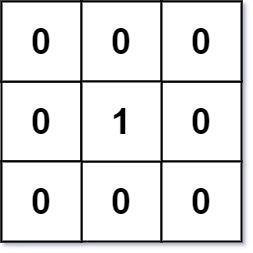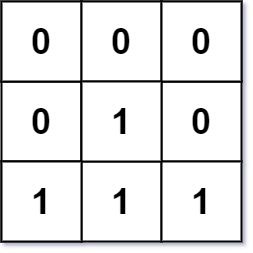Given an m x n binary matrix mat, return the distance of the nearest 0 for each cell.
The distance between two adjacent cells is 1.
Example 1:
Input: mat = [[0,0,0],[0,1,0],[0,0,0]] Output: [[0,0,0],[0,1,0],[0,0,0]]
Example 2:
Input: mat = [[0,0,0],[0,1,0],[1,1,1]] Output: [[0,0,0],[0,1,0],[1,2,1]]
Constraints:
m == mat.lengthn == mat[i].length1 <= m, n <= 1041 <= m * n <= 104mat[i][j]is either0or1.- There is at least one
0inmat.
Method One: Multi-source BFS
Initialize the result matrix ans, where the distance of all zeros is 0, and thus the distance of all ones is -1.
Initialize a queue q to store the positions to be checked by BFS, and enqueue all positions of zeros.
Continually dequeue elements p(i, j) from queue q, inspecting the four neighboring points.
For each neighbor (x, y), if ans[x][y] = -1, then update ans[x][y] = ans[i][j] + 1.
Also, enqueue the position (x, y).
class Solution:
def updateMatrix(self, mat: List[List[int]]) -> List[List[int]]:
m, n = len(mat), len(mat[0])
ans = [[-1] * n for _ in range(m)]
q = deque()
for i, row in enumerate(mat):
for j, x in enumerate(row):
if x == 0:
ans[i][j] = 0
q.append((i, j))
dirs = (-1, 0, 1, 0, -1)
while q:
i, j = q.popleft()
for a, b in pairwise(dirs):
x, y = i + a, j + b
if 0 <= x < m and 0 <= y < n and ans[x][y] == -1:
ans[x][y] = ans[i][j] + 1
q.append((x, y))
return ansclass Solution {
public int[][] updateMatrix(int[][] mat) {
int m = mat.length, n = mat[0].length;
int[][] ans = new int[m][n];
for (int[] row : ans) {
Arrays.fill(row, -1);
}
Deque<int[]> q = new ArrayDeque<>();
for (int i = 0; i < m; ++i) {
for (int j = 0; j < n; ++j) {
if (mat[i][j] == 0) {
q.offer(new int[] {i, j});
ans[i][j] = 0;
}
}
}
int[] dirs = {-1, 0, 1, 0, -1};
while (!q.isEmpty()) {
int[] p = q.poll();
int i = p[0], j = p[1];
for (int k = 0; k < 4; ++k) {
int x = i + dirs[k], y = j + dirs[k + 1];
if (x >= 0 && x < m && y >= 0 && y < n && ans[x][y] == -1) {
ans[x][y] = ans[i][j] + 1;
q.offer(new int[] {x, y});
}
}
}
return ans;
}
}class Solution {
public:
vector<vector<int>> updateMatrix(vector<vector<int>>& mat) {
int m = mat.size(), n = mat[0].size();
vector<vector<int>> ans(m, vector<int>(n, -1));
queue<pair<int, int>> q;
for (int i = 0; i < m; ++i) {
for (int j = 0; j < n; ++j) {
if (mat[i][j] == 0) {
ans[i][j] = 0;
q.emplace(i, j);
}
}
}
vector<int> dirs = {-1, 0, 1, 0, -1};
while (!q.empty()) {
auto p = q.front();
q.pop();
for (int i = 0; i < 4; ++i) {
int x = p.first + dirs[i];
int y = p.second + dirs[i + 1];
if (x >= 0 && x < m && y >= 0 && y < n && ans[x][y] == -1) {
ans[x][y] = ans[p.first][p.second] + 1;
q.emplace(x, y);
}
}
}
return ans;
}
};use std::collections::VecDeque;
impl Solution {
#[allow(dead_code)]
pub fn update_matrix(mat: Vec<Vec<i32>>) -> Vec<Vec<i32>> {
let n: usize = mat.len();
let m: usize = mat[0].len();
let mut ret_vec: Vec<Vec<i32>> = vec![vec![-1; m]; n];
// The inner tuple is of <X, Y, Current Count>
let mut the_q: VecDeque<(usize, usize)> = VecDeque::new();
let traverse_vec: Vec<(i32, i32)> = vec![(-1, 0), (1, 0), (0, 1), (0, -1)];
// Initialize the queue
for i in 0..n {
for j in 0..m {
if mat[i][j] == 0 {
// For the zero cell, enqueue at first
the_q.push_back((i, j));
// Set to 0 in return vector
ret_vec[i][j] = 0;
}
}
}
while !the_q.is_empty() {
let (x, y) = the_q.front().unwrap().clone();
the_q.pop_front();
for pair in &traverse_vec {
let cur_x = pair.0 + x as i32;
let cur_y = pair.1 + y as i32;
if Solution::check_bounds(cur_x, cur_y, n as i32, m as i32) && ret_vec[cur_x as usize][cur_y as usize] == -1 {
// The current cell has not be updated yet, and is also in bound
ret_vec[cur_x as usize][cur_y as usize] = ret_vec[x][y] + 1;
the_q.push_back((cur_x as usize, cur_y as usize));
}
}
}
ret_vec
}
#[allow(dead_code)]
pub fn check_bounds(i: i32, j: i32, n: i32, m: i32) -> bool {
i >= 0 && i < n && j >= 0 && j < m
}
}func updateMatrix(mat [][]int) [][]int {
m, n := len(mat), len(mat[0])
ans := make([][]int, m)
for i := range ans {
ans[i] = make([]int, n)
for j := range ans[i] {
ans[i][j] = -1
}
}
type pair struct{ x, y int }
var q []pair
for i, row := range mat {
for j, v := range row {
if v == 0 {
ans[i][j] = 0
q = append(q, pair{i, j})
}
}
}
dirs := []int{-1, 0, 1, 0, -1}
for len(q) > 0 {
p := q[0]
q = q[1:]
for i := 0; i < 4; i++ {
x, y := p.x+dirs[i], p.y+dirs[i+1]
if x >= 0 && x < m && y >= 0 && y < n && ans[x][y] == -1 {
ans[x][y] = ans[p.x][p.y] + 1
q = append(q, pair{x, y})
}
}
}
return ans
}function updateMatrix(mat: number[][]): number[][] {
const [m, n] = [mat.length, mat[0].length];
const ans: number[][] = Array.from({ length: m }, () => Array.from({ length: n }, () => -1));
const q: [number, number][] = [];
for (let i = 0; i < m; ++i) {
for (let j = 0; j < n; ++j) {
if (mat[i][j] === 0) {
q.push([i, j]);
ans[i][j] = 0;
}
}
}
const dirs: number[] = [-1, 0, 1, 0, -1];
while (q.length) {
const [i, j] = q.shift()!;
for (let k = 0; k < 4; ++k) {
const [x, y] = [i + dirs[k], j + dirs[k + 1]];
if (x >= 0 && x < m && y >= 0 && y < n && ans[x][y] === -1) {
ans[x][y] = ans[i][j] + 1;
q.push([x, y]);
}
}
}
return ans;
}

